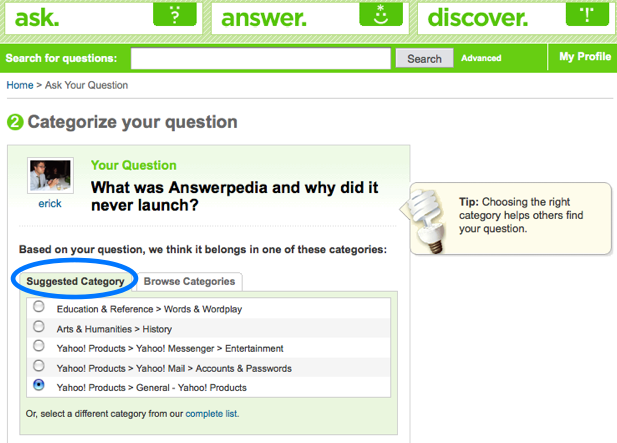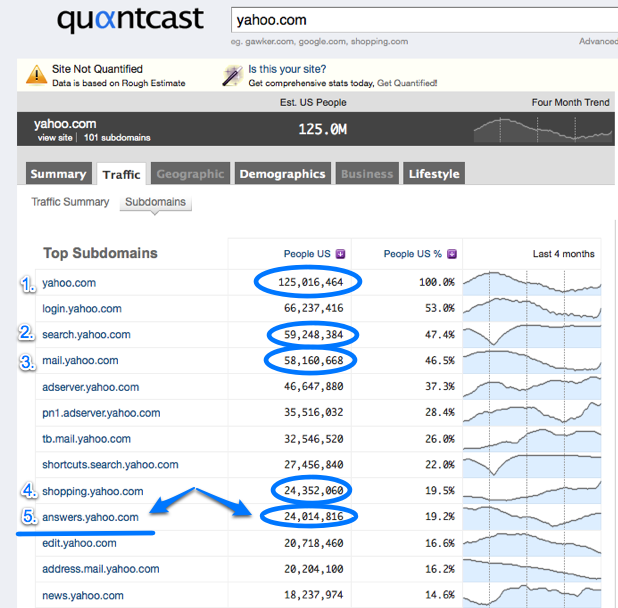Yahoo Answers is three years old this week, and it is the fifth most popular property within Yahoo after the homepage, search, Yahoo Mail, and Yahoo Shopping. (See the table below). According to Quantcast, it attracts 24 million monthly unique visitors in the U.S. ComScore puts the number a bit higher at 33 million monthly U.S. visitors, and 154 million worldwide. It’s a pageview machine, with 1.1 billion a month worldwide.
But Yahoo has not done anything with the Yahoo Answers other than try to sell it. It still gets tons of traffic and you can get an answer to almost any question pretty much immediately, but its growth has stagnated since last April.

Yet Yahoo killed a promising project that could have made Yahoo Answers even better. It was called Answerpedia. The idea was to take the very best answers from Yahoo Answers (the top 5 or 10 percent) and institutionalize them as authoritative topic pages on their own wiki that could be edited and refined. Hence, Answerpedia (which was only ever used as the project’s codename).
In contrast to Wikipedia, Answerpedia was supposed to be a Wiki of experiential knowledge instead of historical fact. It was the place where people would go to find out things like , “What is the best way to get a reservation at a popular restaurant?” or “How do you go about planning for a kitchen remodel?”
Like many promising projects, Yahoo never let it get past the alpha stage. Maybe the next CEO will revive Answerpedia and other internal projects that never saw the light of day. (The halls of Yahoo are littered with them).
A lot of the answers on Yahoo Answers are worthless, but a small percentage are consistently brilliant. This is especially true in categories where many people have specific knowledge such as home repair, literature, finance, pets, cooking, and parenting. Yet these are also areas where search tends to fail or results are inundated with spam. Authoritative pages on these topics would get great search-engine juice and create the basis for a compelling new destination site within Yahoo as well.
If Yahoo doesn’t do this, someone else will. Already, startups are picking up the slack and experimenting with new ways to improve the core idea of a Q&A site. For instance, Mahalo Answers launched yesterday, adding virtual currency and embedding the best answers in its wiki topic pages. Wiki Answers also takes a collaborative approach to coming up with the best answer.
And what about Answerpedia? Well, for one thing, Yahoo does not own the URL. If you type in http://answerpedia.com/, it redirects you to Facebook, of all places (Update: The site now directs to a simple landing page). That might not be an issue, though, as all of Yahoo’s product use a Yahoo URL (like answerpedia.yahoo.com).
And here’s another curiosity. When I asked a question on Yahoo Answers about what it was and why it never launched, “Yahoo Products” came up a suggested category for the question. As for why it never launched, I am still waiting for an answer to that one.
Update: And we have an answer from someone who says he is one of the founding engineers of Yahoo Answers:
Answerspedia would have been more peanut butter =)
Maybe, but there is a difference between spreading yourself too thin and just sitting on the ball.

